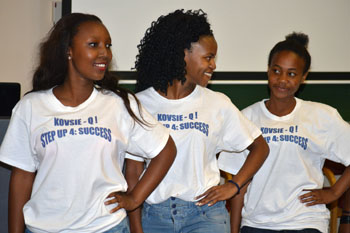
Photo: Supplied |
“The University of the Free State is a caring community where everybody counts.” With this message, Dr Choice Makhetha, Vice-Rector: External Relations welcomed our first-years on the Qwaqwa Campus.
“Whether you are a first-year or a senior student, whether you are a cleaner or a research professor, we all have one thing in common: our humanity,” Dr Makhetha said.
“This is the stage where you are going to shape the person you want to be,” Dr Makhetha said to the audience of eager first-year students who had already spent a week undergoing a rigorous Gateway Orientation programme.
“A lot of things will happen during your stay here and one of them is making friends. Make friends with people from outside your comfort zone,” Dr Makhetha added. “Make friends with those who have a totally different background from yours so that you can learn, broaden and enrich your life.”
“Read broadly and ask questions – for questions will take you far beyond your area of study,” she said.
Zethu Mhlongo, Deputy President of the Qwaqwa Campus Student Representative Council (SRC) encouraged first-years to always remember why they chose our university in the first place.
“Enjoy your stay, get your degree and step up for success,” Mhlongo said.